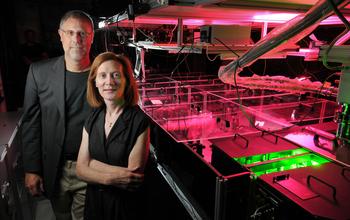Ambitious, complex research that leads to breakthrough discoveries requires large-scale, long-term investments. Today, the National Science Foundation (NSF) announces $94 million in funding to support four new Science and Technology Centers (STCs), partnerships that lay the foundations for advances in fields ranging from cell biology and mechanobiology to particle physics and materials science.
Each awardee will receive up to $24 million over a five-year period, with the possibility of a continuation for five additional years. In addition to these latest awards, NSF supports eight active STCs across the U.S.
Created in 1987, the STC Integrative Partnerships program supports collaborative, world-class research in areas of national importance. STCs address grand challenges at the intersection of scientific disciplines as well as focusing on new approaches to science and engineering within disciplines. Each STC involves partnerships across universities, federal labs, industry and other organizations.
"From deepening our understanding of intelligence, to developing energy-efficient electronics and next-generation polymers, NSF's Science and Technology Centers have stood at the forefront of discovery and innovation," said Suzi Iacono, head of the NSF Office of Integrative Activities. "The program's history sets high expectations for these newly awarded partnerships, and I'm pleased to see recipients poised to continue that legacy."
In addition to performing innovative research, STCs provide rich environments for training scientists and engineers. They actively integrate research and education, treating inquiry, discovery and creativity as inherent parts of the learning process. NSF also expects the centers to recruit, retain and mentor participants from groups traditionally underrepresented in science, technology, engineering and mathematics (STEM).
This year's four newly awarded STCs, principal investigators and their co-principal investigators and their sponsor institutions are:
Center for Bright Beams, J. Ritchie Patterson, Georg H. Hoffstaetter, Cornell University
Accelerators are important scientific tools that use beams of charged particles to investigate particle physics. This center's overarching research goal is to decrease the cost of key accelerator technologies while simultaneously increasing the intensity ("brightness") of charged particle beams by two orders of magnitude (roughly 100 times more intense). This STC will contribute to scientific advances in many disciplines, ranging from physics, to chemistry, to biology, by enhancing accelerator capabilities. The center will partner Cornell University with the University of Chicago; Chicago State University; the University of California, Los Angeles; the University of Florida; the University of Maryland; Brigham Young University; Morehouse College; Clark Atlanta University; the University of Toronto; the Fermi National Accelerator Laboratory; the Lawrence Berkeley National Laboratory; and TRIUMF (Canada's national laboratory for particle and nuclear physics and accelerator-based science).
Center for Cellular Construction, Wallace Marshall, Zev J. Gartner, Wendell Lim, University of California, San Francisco
Cell biology is a rapidly expanding field of science that explores the structure and properties of cells, yielding revolutionary discoveries in biology. This center's goal is to transform cell biology into a discipline that uses tools from engineering, and the physical and computer sciences to generate a greater understanding of the rules that govern cell behavior, while also enabling the design of cells that have useful functions. The center will develop tools to predict, design and test the impact on cellular function of changes to their internal organization. It will also create tools for building multicellular and multi-organism structures and develop living "bioreactors" that will generate products of commercial value. This STC will partner the University of California, San Francisco with University of California, Berkeley; San Francisco State University; Stanford University; the IBM Almaden Research Center; and the Exploratorium.
Science and Technology Center for Engineering MechanoBiology, Yale E. Goldman, Vivek B. Shenoy, Rebecca G. Wells, University of Pennsylvania; Guy Genin, Ram V. Dixit, Washington University in St. Louis; Christopher Chen, Boston University
Mechanobiology is a field that focuses on how forces influence plant and animal systems. This center's mission is to discover the principles that govern how biological systems communicate using molecular and cellular methods. The center will provide the intellectual foundations and materials for engineering new and powerful cell-based devices, and for training students in the foundations of mechanobiology. The center will bring together leading researchers from a diverse group of disciplines and institutions at the intersection of biology, mechanics and engineering. This STC will partner the University of Pennsylvania with Washington University in St. Louis; the University of Maryland; the New Jersey Institute of Technology; Bryn Mawr College; Alabama State University; and Boston University.
Science and Technology Center on Real-Time Functional Imaging, Margaret Murnane, Rafael Piestun, Markus B. Raschke, University of Colorado at Boulder; Naomi S. Ginsberg, University of California, Berkeley; Jianwei Miao, University of California, Los Angeles
As discoveries in science and technology proliferate at the nanometer and atomic scales, real-time functional imaging, which gives researchers the ability to detect what's happening at those tiny scales, becomes increasingly important. This center aims to advance real-time functional imaging by moving away from the current approach of using microscopes that employ a single imaging method -- optical, X-ray, nano-probe or electron microscopy, for example -- by combining and improving those techniques. Ultimately, the center seeks to enhance the research community's understanding of the structure and functionality of various types of matter as they change over time. This STC will partner the University of Colorado at Boulder with Fort Lewis College; Florida International University; the University of California, Berkeley; the University of California, Irvine and the University of California, Los Angeles.
Source: National Science Foundation News

